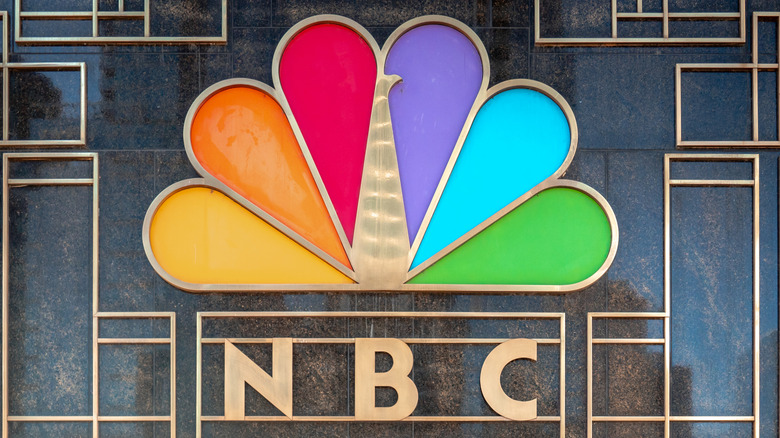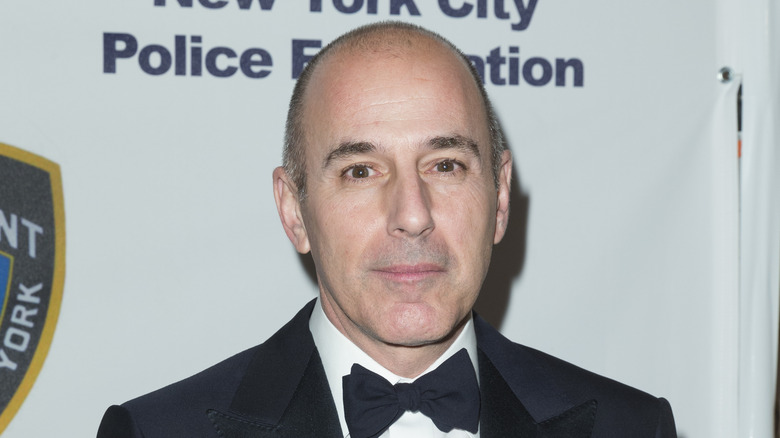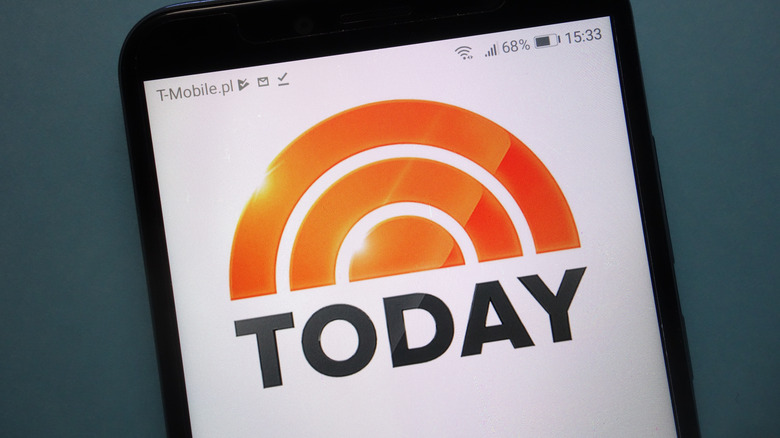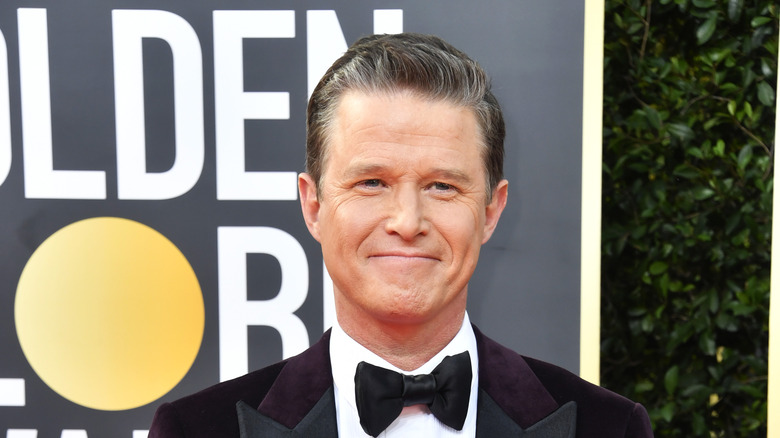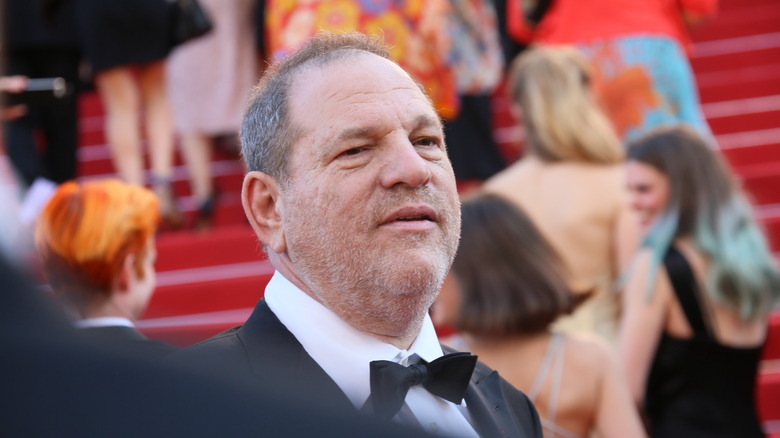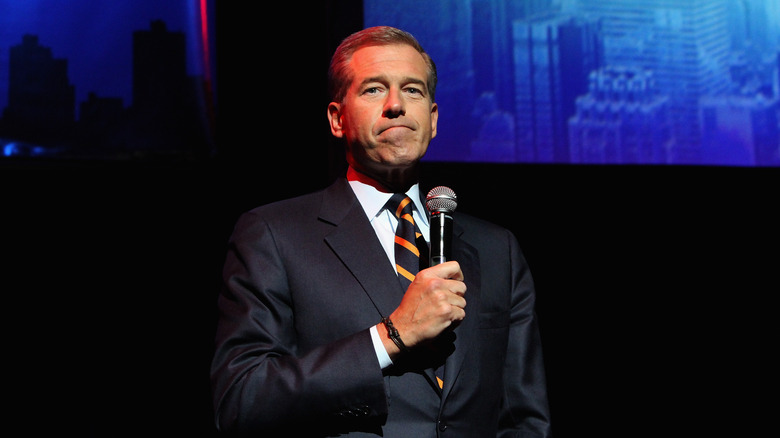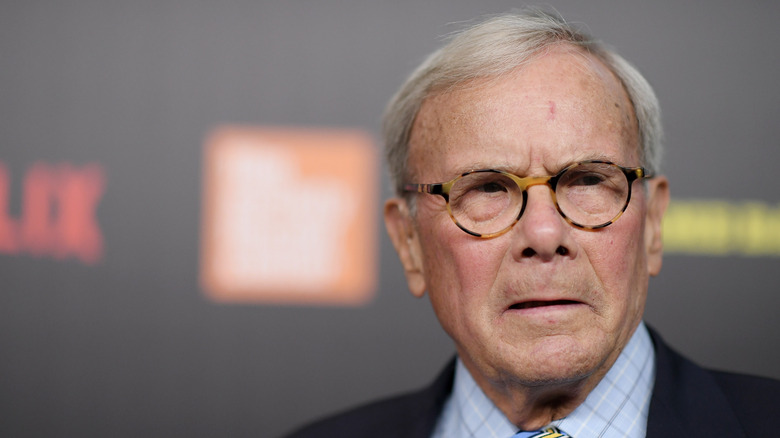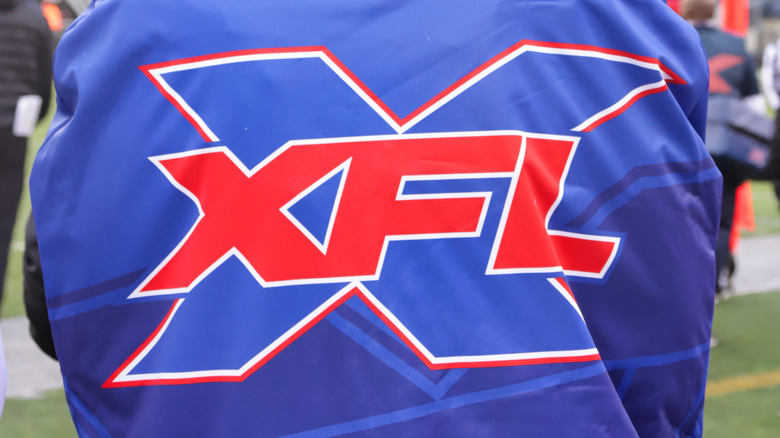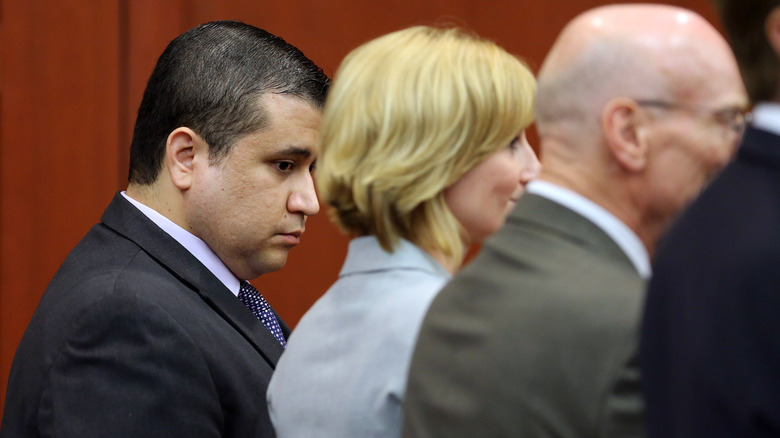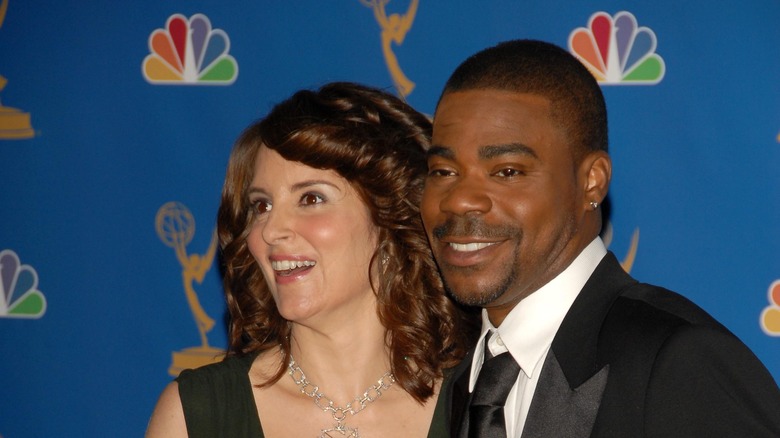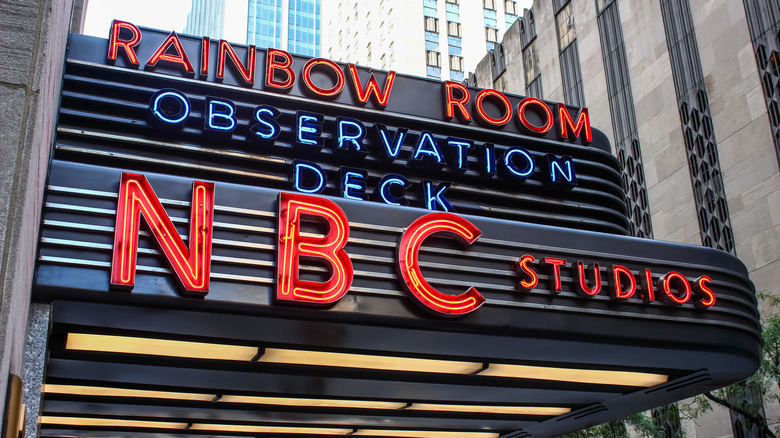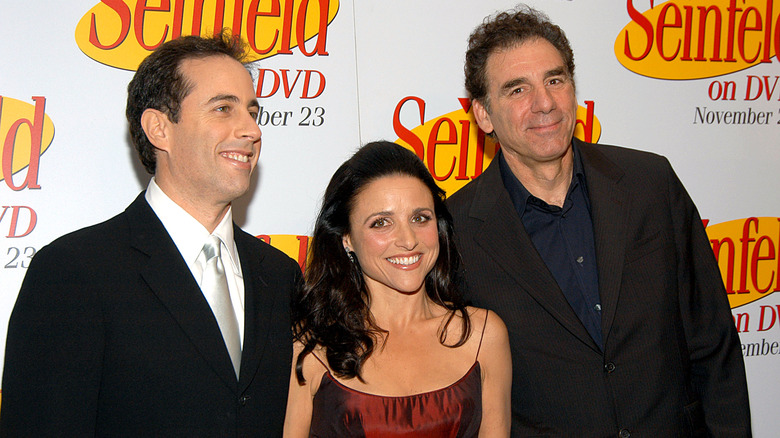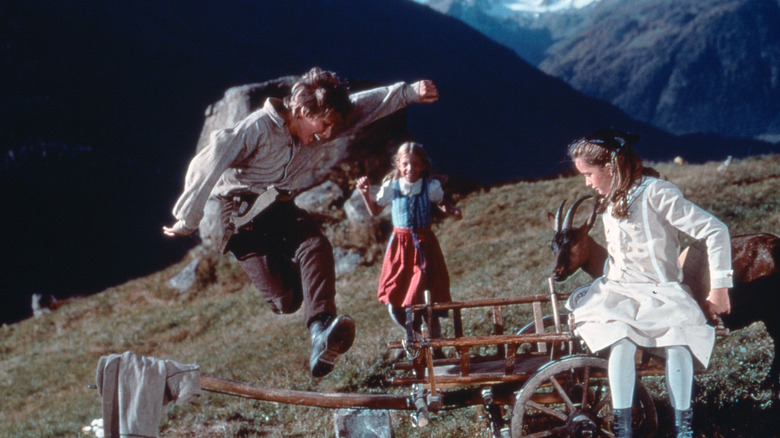The Biggest Scandals To Hit NBC
The National Broadcasting Company (NBC) is one of America's oldest media organizations and is, according to Encyclopedia Britannica, the first permanent radio network and oldest public broadcasting company in the United States. The company pioneered radio entertainment and news before doing the same for television. The network has been with Americans for almost a century, and any of the country's most beloved cultural and media icons were birthed by NBC — from "Star Trek" to "Seinfeld" to "Saturday Night Live" and the NFL to MSNBC and the "Today" show.
Anything that old is guaranteed to have lost the remote a few times and possibly even have embarrassed themselves once or twice. NBC's old enough to have made some mistakes it isn't proud of, to have more than a few skeletons in its closet, and, ironic for a media company, more than a few episodes that it doesn't want to be reminded of.
NBC fires star Today Show host Matt Lauer
Since its 1952 premiere, the "Today" show has grown into an NBC mainstay. Helmed for 20 years by Matt Lauer, "a marquee name with the network," says NBC, who "helped 'Today' remain a ratings powerhouse." Lauer was among the highest-paid people in news media, earning $20 million a year in his last contract in 2016. It was his last because the next year, NBC fired Lauer after a review of his behavior prompted by a colleague's accusation of sexual misconduct. The NBC News chairman said Lauer was fired for "clear violation of our company's standards."
Lauer was accused of showing off his unmentionables at work, sending sex toys to female colleagues, and harassing women for sex. Among the creepier details are that Lauer had a button installed at his desk to remotely close and lock the door to his office, which at least two women said Lauer used while alone with them in his office. Although, to be fair, according to Architectural Digest, "high-powered executives" and celebrity offices often have such buttons installed for people worried about active shooters or the like.
Far more lurid and, for NBC, damaging, stories about Lauer emerged two years later. Vanity Fair reported that a former NBC News assistant had accused Lauer of rape and NBC of covering it up, telling a reporter "She told colleagues and superiors at NBC," but nothing ever came of it.
The Today Show's repeated on-air cringes
Award-winning it may be, but the "Today" show has, no surprise after nearly 70 years on the air, logged quite a few turds alongside their trophies. There were plenty of common and understandable mistakes, like that time a hot mic caught a host swearing. There were also some "experimental but it was the '50s so excusable?" mistakes, like that time they had a drugged chimpanzee co-host, and even some bizarrely catty yet hilarious mistakes, like that time new host Jenna Bush Hager gushed on-air about a present from Kathy Lee Gifford, whom she replaced, that was actually intended for her co-host.
Matt Lauer had a knack for drawing many of his "Today" interviewees into visibly uncomfortable conversations. ET describes a 2010 interview with Kanye West, in which Lauer had embarrassing video of West playing in the background, agitating the star, and the 2012 interview with Anne Hathaway where Lauer asked her about paparazzi snapping revealing photos of her.
There were a few tragic mistakes as well. When reporting on the death of performer Amy Winehouse, according to E!, "Today" accidentally aired video of her song "You Know I'm No Good" with the caption "You Know I'm Dead." Kathie Lee Gifford mortified herself in real time when she asked actor Martin Short about how marriage is going and his wife is doing. During the next commercial break, Short informed her his wife had died two years before, and Gifford apologized on-air when they came back.
Today Show host Billy Bush was fired for Trump's 'grab 'em' clip
Billy Bush is a junior member of the Bush dynasty, cousin to a governor and a president, nephew to another president. Wisely, this Bush pursued a career outside of politics and has been a successful radio and television personality for over 20 years. Perhaps less wisely, during his time at "Access Hollywood," Bush had a very candid behind-the-scenes chat with then-TV celebrity Donald Trump, a recording of which made its way into the public ten years later during the obnoxiously contentious 2016 presidential election.
In 2016, Bush had joined NBC's "Today," and Donald Trump had become the Republican candidate for president. Just a month before election day, barely a year after Bush had joined "Today," the audio of Bush and Trump's conversation was leaked to the media. "Bush is heard laughing," reported the Chicago Tribune, "as Trump talks about fame enabling him to grope and try to have sex with women not his wife." NBC fired Bush before the end of the weekend, which they didn't even tell him. "It was leaked on a Friday," Bush told CBS (via the Daily Mail), "and then Sunday morning I walked ... to go back to work and the driver said, "I'm sorry. They've canceled the car.'" According to the Associated Press, Bush now works at Extra, an entertainment news show, where he uses his experience of getting fired to secure interviews with celebrities "getting the flogging and the public shaming."
NBC buried the Harvey Weinstein story
For decades, Harvey Weinstein was one of the most powerful people in Hollywood before becoming the poster boy for #MeToo and going to prison for multiple sex crimes. Journalist Ronan Farrow's exposé did more than reveal Weinstein's atrocious conduct, however — it also revealed the pernicious influence he had in the media.
Weinstein's behavior was an "open secret," says Farrow, "and Weinstein and his associates used nondisclosure agreements, payoffs, and legal threats to suppress [victims'] accounts." Although both parties vehemently denied it, Farrow said, per Vanity Fair, that "Harvey Weinstein Used Matt Lauer Blackmail to Pressure NBC." Farrow suggests that NBC had basically been covering up for Lauer for years, and Weinstein knew about it. Besides being stymied by NBC, Farrow said, according to The Washington Post, that Weinstein had him, and other journalists looking into the story, followed by a group of "former Mossad agents, Ukrainian surveillance pros, [and] European undercover operatives."
Entertainment journalist Paula Froelich told WYNC that she personally witnessed an example of Weinstein's corrupting status in the media in 2000 when he assaulted a journalist at a party, in front of other journalists, and nobody reported on it. "People don't want to report on the table; they want a seat at it," she said. Froelich actually wrote about the incident for the New York Post but says that what was published was "nothing like" what she had written.
Brian Williams was demoted for inventing a war story
Brian Williams is an old-school newsman. He started reporting almost immediately after not graduating college before joining NBC news in 1993, where he would stay for the rest of his career. He rose to become anchor of the network's premiere news program, "NBC Nightly News," in 2004, garnering several excellence in broadcasting awards over the following decade in that position. "Nightly News" brought in an average of "about 9 million to 10 million viewers a night," according to USA Today, Williams was one of the highest-paid people in news, and he was a popular mainstay on late shows like "The Daily Show."
Then multiple Iraq War veterans began publicly questioning a story that Williams liked to repeat about being shot at in a helicopter. Doubt was cast on the accuracy of his story, and other news outlets began examining Williams' reporting. He was accused of inventing dead bodies floating in the streets of New Orleans after Katrina, and NBC started an investigation. "Brian misrepresented events which occurred while he was covering the Iraq War," said NBC News president Deborah Turness in a memo to NBC personnel explaining why he was being suspended and demoted.
Weep not for Williams, however. After a six-month suspension, Williams returned to the air as an anchor on MSNBC, where his $10 million annual salary, reports Showbiz Cheat Sheet, remains intact. As of 2019, his net worth is in the neighborhood of $40 million.
Innocent terrorism suspect sues NBC
Despite billions of dollars of advertising and infrastructure, hundreds of millions of people watching, and tens of thousands of spectators watching hundreds of world-class athletes, the 1996 Atlanta Olympics has unfortunately become known for death. Twenty-nine-year-old Eric Robert Rudolph, explains Atlanta Magazine, enraptured by "hate-filled propaganda denouncing gays, abortion, [and] the government," planted a series of bombs at the Olympic venues. One person was killed in the blasts, and over 100 more were injured.
Richard Jewell was a former cop and security guard at the Olympics. He alerted authorities to a suspicious package stuffed beneath some bleachers; the area was being evacuated as the bomb squad arrived — just before the explosion. At the 10th anniversary of Atlanta Olympics, the Georgia governor honored Jewell "for his heroism on the night of the bombing." Before his bravery was recognized, however, Jewell was subject to an intense media spectacle that basically painted him as the terrorist.
In the wake of multiple media reports suggesting he was involved with the plot he helped foil, Jewell sued the Atlanta-Journal Constitution, Tom Brokaw and NBC News, CNN, the New York Post, and Time magazine. Some of Jewell's lawsuits were thrown out, but according to The Wall Street Journal, NBC was among those who settled, reportedly paying him "over $500,000 — far more than the 'nuisance value' that is occasionally offered to potential plaintiffs."
Tom Brokaw had to apologize for telling Latinos to learn English
One of America's "Big Three" news anchormen for two decades, legendary broadcaster Tom Brokaw started with NBC in 1966 and only announced his retirement in January 2021. He's penned several bestselling books and received numerous awards in journalism, and per NBC, Brokaw was "the only anchor to have helmed all three of NBC News' flagship programs: 'TODAY,' 'Nightly News' and 'Meet the Press.'" Brokaw was even awarded the Presidential Medal of Freedom, the highest honor a president can bestow on a civilian, by President Obama in 2014. But five years later, he was made to apologize for telling Latinos to learn English.
During a live panel discussion on NBC's "Meet the Press" on then-President Trump's proposed border wall in 2019, Brokaw repeated sentiments from people he spoke with that were concerned with "intermarriage" and if they "want brown grand-babies" and then "expressed personal feelings," according to NBC, "that 'the Hispanics' need to work harder at assimilating, speaking English and learning to be comfortable in other communities." The online backlash was swift, and NBC's social media was flooded with angry lambastings and excoriations of Brokaw's statement as ignorant at best, if not outright xenophobic. "I am sorry, truly sorry my comments were offensive to many," Brokaw said on Twitter. "The great enduring american tradition of diversity is to be celebrated and cherished."
The extreme failure of the XFL
The XFL was a bold, some said doomed, joint venture between NBC and wrestling tycoon Vince McMahon that sank millions of dollars into a new professional football league. "Organizers wanted to name their league the 'eXtreme Football League,'" said The Washington Post, but they decided, as a different league already had that name, that "the 'X' was supposed to stand for anything but the NFL, which they considered to be stuffy and boring."
XFL games were, according to Business Insider, designed to be more, well, extreme. The cheerleaders wearing less and league rules "making the game more violent" were features of everything McMahon said about the XFL and adorned every piece of suggestive league advertising. Teams were given names like the "Memphis Maniax," and individual players encouraged "to have catchy nicknames like 'He Hate Me.'" Plenty of people were skeptical, and a February 2001 Sports Illustrated cover asked: "Will sleazy gimmicks and low-rent football work for the XFL?"
Unfortunately, no. McMahon spent too much time hyping his league and not enough developing it, said Business Insider. After all the flashy commercials and crazy antics, "McMahon built it up so much, and left so little time for players to train, that by the time the games aired, they were a letdown." In the end, the XFL didn't last more than a season and, according to ABC, lost NBC and McMahon $70 million. McMahon rebooted the XFL in 2020, but NBC is not participating.
NBC apologizes for airing edited audio of 911 call
Seventeen-year-old Trayvon Martin was shot and killed in 2012, by George Zimmerman. Prior to the shooting, Zimmerman had been following Martin and called 911 to report Martin as suspicious. In their coverage of the events, NBC aired what many people called an edited-out-of-context cut of that 911 call.
During their broadcast, Zimmerman is heard saying, "This guy looks like he's up to no good ... He looks black." What NBC's viewers didn't hear, however, as The Christian Science Monitor describes, was the 911 dispatcher asking: "OK, and this guy — is he black, white, or Hispanic?" Then Zimmerman answered, "He looks black." NBC publicly apologized to Zimmerman, saying that "it became evident that there was an error made in the production process that we deeply regret." According to The Hollywood Reporter, NBC fired at least three journalists involved in allowing it to air.
Zimmerman sued NBC for defamation, explains the Monitor, alleging "that NBC's editing made him appear to be racist and opened him up to public ridicule and threats, which resulted in emotional distress and anguish." Two years after Martin was killed, a judge threw out Zimmerman's lawsuit. The court ruled that since he had "pursued a course of conduct that ultimately led to the death of Martin," Zimmerman had become a public figure and thus needed to prove "that the network had acted with malicious intent — the standard required to prevail in a libel suit involving a public figure."
Dateline faked an exploding car for a story
Rumors swirled in 1992 that GM's new line of Chevrolet pickups had a bad habit of exploding on impact. That November, NBC's new investigative news program, "Dateline," aired an hour-long special report on the subject, according to Entertainment Weekly, titled "Waiting to Explode?" With a name like that, several NBC producers apparently thought, the program had better show some explosions, so, says EW, "To try to ensure dramatic footage, the show's producers allowed incendiary devices to be strapped to trucks for a crash-test demonstration." Viewers watched in horror as a test vehicle burst into flames after a crash. GM executives, however, watched in outrage. They immediately sued NBC and yanked all GM product commercials off the network.
NBC apologized profusely. Both "Dateline" anchors had to give a three-and-a-half-minute formal apology on-air. Then the network executives launched an investigation. "Understand us clearly," said the NBC president in a statement, reported The Baltimore Sun, "...a piece of bad journalism went out over our air. It reflected neither our character nor our intent. ... It must not happen again." Three "Dateline" producers were forced to resign, and the on-air correspondent who reported the GM story was demoted. NBC's internal investigation ultimately concluded that recent "downsizing and cost-cutting" resulted in a fundamental breakdown in "the editorial process."
NBC and Tina Fey apologized for Tracy Morgan's outburst
The sitcom "30 Rock" was an award-winning, long-running star of NBC's primetime lineup. Running for seven seasons, "30 Rock" was a satirical take on the experiences of the show's star, writer, and producer, Tina Fey, as head writer for another NBC property, "Saturday Night Live." The crew of "30 Rock" was dotted with "SNL" alumni, from the writing staff to the producers, but mostly notably by Fey's fellow star comedian, Tracy Morgan, who was only supporting cast but frequently stole the show as well as occasionally making the wrong kind of headlines.
Morgan got his start as a stand-up comedian and never stopped, even when while filming "30 Rock," performing live. At a 2011 comedy show in Nashville, Morgan made a joke that was widely criticized as homophobic, and NBC was quick to distance themselves from their star's comments. "Tracy's comments reflect negatively on both '30 Rock' and NBC — two very all-inclusive and diverse organizations," said an NBC executive, according to the "Today" show, "and we have made it clear to him that this kind of behavior will not be tolerated." Morgan apologized as well, and Fey hoped his apology would be accepted but added, "Stand-up comics may have the right to 'work out' their material in its ugliest and rawest form in front of an audience, but the violent imagery of Tracy's rant was disturbing to me."
Saturday Night Live over and over again
"Saturday Night Live" was, show creator Lorne Michaels said to Rolling Stone, designed to be a "a comedy show, frank and intelligent, for young, urban adults." The show was supposed to be risky, irreverent, and relevant: topical comedy and popular music amid the perils of performing live. In fact, Michaels demanded that it be a live show in part "because if they saw it beforehand they'd say. 'You can't do that on television.'" It's no surprise, then, that a show explicitly created to take comic chances would end up making controversy.
There are the number of times that "SNL" cast members, writers, and guest stars have had to apologize for saying or doing all manner of offensive/hilarious/you decide things. There was that time they mocked the murder of a skier with a skit composed of stock footage of skiers tumbling to a soundtrack of gunshots. Paul Shaffer told Entertainment Weekly that he thought his career was over when he made history by dropping the first-ever F-bomb on SNL in 1980. According to the Associated Press, six years later, NBC courted controversy by censoring guest comedian Sam Kinison's weed joke from airing on the West Coast broadcast of "SNL." Rap group Cypress Hill was banned, so far permanently says Far Out, for smoking a joint during their performance. There is, of course, also the constant drumbeat of backstage drama as well, which, as Ranker describes, sometimes spilled over into headlines and caused actual backstage fistfights.
Seinfeld insulted Puerto Ricans so bad that NBC banned an episode
"Seinfeld" was a juggernaut in sitcom history. Over its nine seasons, the infamous "show about nothing" was nominated for 186 different awards, winning 74, including 27 Emmys. And the show has staying power. According to Ceros, when Hulu had exclusive rights to "Seinfeld," "the average age of their 'Seinfeld' viewer [was] 27, meaning they were in 2nd grade when the finale aired." The show has since moved to Netflix, for which, The Wrap reported, Jerry Seinfeld was paid over $100 million. Vulture calculated the worth of the 'Seinfeld' "financial empire" since it entered syndication at over $3 billion. (Lucre that Jerry has tried to freeze his costars out of, Jason Alexander told The Globe and Mail.)
The eponymous star's contemptible business practices aside, and ignoring the plethora of his and his costars' unrelated naughtiness, "Seinfeld" was actually relatively controversy-free. There is, of course, an outlier: A "Seinfeld" episode in which Kramer burns a Puerto Rican flag on accident was so offensive that everyone involved apologized, and the network pulled the episode from syndication for four years. "The Puerto Rican Day" aired in 1998, and, "The episode so incensed New Yorkers," reported the New York Post, "especially Hispanics, that it was yanked from syndication in the New York market" until 2002.
NBC turned off a close football game
A close 1968 American Football League game pitted the Oakland Raiders against the New York Jets. It was an intense, back-and-forth, game "with each team stealing the lead from the other six times," according to NPR, "before it was all tied up." A lot of penalties and timeouts had dragged the game time a bit long. With just over a minute of play to go, the Jets got a field goal, taking the lead by three. With just under a minute left, the Raiders got possession and, in a stunning turnabout, scored twice in nine seconds, winning the game 43-32.
Unfortunately, most of the country didn't get to watch it because NBC switched to their regularly scheduled programming. So, except for people actually in the stadium, along with viewers on the West Coast (because of time zone differences), instead of seeing one of the greatest upsets in football history, fans stared in agony as "a little girl with braids in the Swiss Alps starts walking down a hill." According to History, "Heidi" was a film NBC executives "were sure would win them high ratings during November sweeps." They apparently didn't anticipate angry football fans calling the network to complain. As sports journalist Dave Zirin told NPR, "Men who would not get out of their armchairs for earthquakes made their way to the phone to call in to NBC." The infamous debacle is now known as the "Heidi game."
